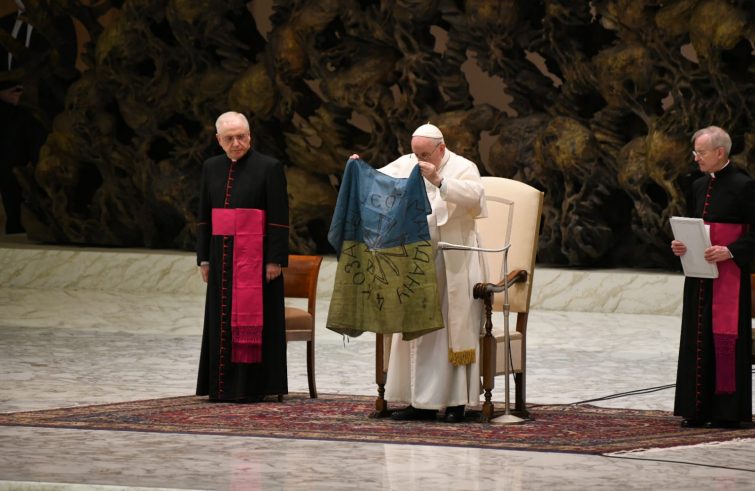
“The recent news of the war in Ukraine, rather than bringing relief and hope, attests instead of new atrocities, like the massacre in Bucha,” the Pope denounced in his closing remarks during Wednesday’s general audience, before his greetings to the Italian-speaking faithful. “Ever more horrendous cruelty done even against defenceless civilians, women and children”, Francis continued: “They are victims whose innocent blood cries to Heaven and implores: put an end to this war! Silence the weapons! Stop sowing death and destruction!” “Let us pray together for this”, Francis said to the faithful gathered in Paul VI Hall, who gathered in a silent prayer with the Holy Father. “And yesterday, precisely from Bucha, they brought me this flag”, Francis said, and he stood up to unfold it for everyone to see. “This flag comes from the war, precisely from that war-torn city, Bucha”, he explained: “There are also some Ukrainian children who are here with us. Let us greet them and pray together with them.”
“These children had to escape and come to a foreign land”, the Pope said while the children were gathered around him on the podium: “This is one of the fruits of war. Let us not forget them, and let us not forget the Ukrainian people.”
The Holy Father distributed Easter eggs to the children, he remarked: “It is hard to be uprooted from your own land due to war.” Francis referred to the ongoing conflict also at the beginning of his catechesis, dedicated to the stages of his apostolic journey to Malta, with an explicit statement:
“Today we often hear about ‘geopolitics’. But unfortunately, the dominant logic are the strategies of the most powerful countries to affirm their own interests, extending their area of economic influence, or ideological influence, and/or military influence. We are seeing this with the war.”
In this scheme, Malta represents “the rights and power of the ‘small’ nations, small but rich in history and civilization that should lead toward another logic – that of respect and freedom –, of the coexistence of differences, opposed to the colonization of the most powerful”, the Pope said. “We are seeing this now. And not only from one side: even from others…” he added off text:
“After World War II, the attempt was made to lay the foundations of a new era of peace. But, unfortunately – we never learn, right? – the old story of competition between the greater powers went on. And, in the current war in Ukraine, we are witnessing the impotence of the Organizations of the United Nations.”
Furthermore, “Malta is a key-place regarding the phenomenon of migration”, Francis pointed out mentioning the meeting with migrants at the John XXIII welcome centre. “We must never tire of listening to their testimonies because only this way can we emerge from a distorted vision that is often circulated in the mass media, and the faces, the stories, the wounds, the dreams and the hopes of these migrants can emerge”, the plea: “Every migrant is unique. He or she is not a number but a person. Each is unique just like each one of us. Every migrant is a person with dignity, with roots, with a culture. Each of them is the bearer of a wealth infinitely greater than the problems they bring.”
“And let us not forget that Europe was made of migrations”, the Pope added in unscripted remarks. “Certainly, welcoming them must be organized – this is true – and supervised; and first, long before, it must be planned together, at an international level”, the Pope underlined: “The phenomenon of migration cannot be reduced to a crisis; it is a sign of our times. It should be read and interpreted as such. It can become a sign of conflict, or rather a sign of peace. It depends on how we take it; it depends on us.”
Finally, Malta is a laboratory for peace and the key-place from the perspective of evangelisation as well. “From Malta and from Gozo, the country’s two dioceses, many priests and religious, but even lay faithful, left to bring their Christian witness all over the world”, Francis reminded the faithful: “It is as if Paul’s passing through there left his mission in the DNA of the Maltese! For this reason, my visit was above all an act of gratitude – gratitude to God and to the holy, faithful people from Malta and Gozo.” “Nevertheless, the wind of secularism, of a globalized pseudo culture based on consumerism, neocapitalism and relativism, blows there as well”, the Pope’s analysis: “Therefore, it is time for the new evangelization there too.”
“The joy of the Church is to evangelize!”, Francis exclaimed. “Let us not forget this any longer: it is the most beautiful definition of the Church”, he repeated quoting Paul VI.
The Pontiff thus went on to renew his gratitude to the President of the Republic of Malta, “so courteous and brotherly”: “Thanks to him and to his family; to the Prime Minister and the other Civil Authorities who welcomed me with such kindness; as well as the Bishops and all the members of the ecclesial community, to the volunteers and to all who accompanied me in prayer.” “I would not want to neglect to mention the welcome Centre for migrants, John XXIII”, the Pope concluded with unscripted remarks: “the Franciscan Friar there who keeps it going at the age of 91, and continues to work thus with collaborators from the diocese. It is an example of apostolic zeal and love for migrants which is very much needed today. Through this visit, we sow, but it is the Lord who gives the growth. May His infinite goodness grant abundant fruit of peace and every good to the dear Maltese people! Thanks to the Maltese people for such a human, such a Christian welcome!”.









